Written by: Anindya Gayuh Pangestu (CIMSA UNPAD) & Andi Annisa Rusyda Khafiyani (CIMSA UNPAD)
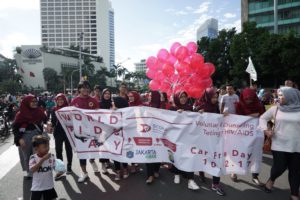 HIV (Human Immunodeficiency Virus) is a word that is already familiar to our ears. A virus that has been around for decades and becoming the major cause of HIV and AIDS. Currently, the number of people living with HIV / AIDS in Indonesia is increasing. Based on research results and academic data from UNAIDS Indonesia and the Ministry of Health Republic of Indonesia, HIV prevalence in Jakarta alone is approximately 1.3 percent, with the prevalence among prisoners at around 6.5 percent and people who inject drugs at 36.4 percent.
HIV (Human Immunodeficiency Virus) is a word that is already familiar to our ears. A virus that has been around for decades and becoming the major cause of HIV and AIDS. Currently, the number of people living with HIV / AIDS in Indonesia is increasing. Based on research results and academic data from UNAIDS Indonesia and the Ministry of Health Republic of Indonesia, HIV prevalence in Jakarta alone is approximately 1.3 percent, with the prevalence among prisoners at around 6.5 percent and people who inject drugs at 36.4 percent.
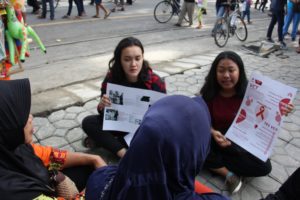 HIV attacks the immune system, especially CD4 cells (T cells), which help the immune system fight off infections. HIV makes a person vulnerable to other infections or cancerrelated infections. Over time, HIV can destroy so many cells in the body that it can not fight off infections and diseases anymore. In contrast to what happens to some other viruses, if a person is infected with HIV, then this virus can not be removed completely from the body despite being treated. A person can get and / or transmit HIV through activities such as sexual behavior and / or needle use. Only certain body fluids such as blood, semen, anal fluid, vaginal fluid, and breast milk from people who have HIV can transmit HIV itself. This fluid must be in contact with mucous membranes (found in the rectum, vagina, penis, and mouth) or tissue damaged or directly injected into the bloodstream (from the syringe) for transmission.
HIV attacks the immune system, especially CD4 cells (T cells), which help the immune system fight off infections. HIV makes a person vulnerable to other infections or cancerrelated infections. Over time, HIV can destroy so many cells in the body that it can not fight off infections and diseases anymore. In contrast to what happens to some other viruses, if a person is infected with HIV, then this virus can not be removed completely from the body despite being treated. A person can get and / or transmit HIV through activities such as sexual behavior and / or needle use. Only certain body fluids such as blood, semen, anal fluid, vaginal fluid, and breast milk from people who have HIV can transmit HIV itself. This fluid must be in contact with mucous membranes (found in the rectum, vagina, penis, and mouth) or tissue damaged or directly injected into the bloodstream (from the syringe) for transmission.
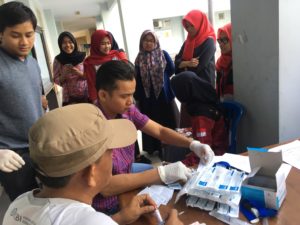 Seeing how great HIV is when it succeeds in attacking a person’s body, it is absolutely necessary to have a perfect test as a precautionary measure. One of the tests that can be done is Voluntary Counseling and Testing or VCT. VCT includes voluntary HIV testing and counseling before and after the test. The test is performed by a VCT counselor after the client signed an informed consent. The main point of this test is ‘voluntary’ that aims for those who are concerned about their HIV status and want to perform the test without any force. This VCT test, though voluntary, remains confidential. Counseling done at VCT helps a person to know their HIV status early. This counseling emphasizes aspects of behavior change, dealing with stress, and problem-solving skills. In the implementation, VCT uses several principles such as voluntarily perform HIV testing, trust and maintain confidentiality, and also maintain effective relationships between counselors and clients.
Seeing how great HIV is when it succeeds in attacking a person’s body, it is absolutely necessary to have a perfect test as a precautionary measure. One of the tests that can be done is Voluntary Counseling and Testing or VCT. VCT includes voluntary HIV testing and counseling before and after the test. The test is performed by a VCT counselor after the client signed an informed consent. The main point of this test is ‘voluntary’ that aims for those who are concerned about their HIV status and want to perform the test without any force. This VCT test, though voluntary, remains confidential. Counseling done at VCT helps a person to know their HIV status early. This counseling emphasizes aspects of behavior change, dealing with stress, and problem-solving skills. In the implementation, VCT uses several principles such as voluntarily perform HIV testing, trust and maintain confidentiality, and also maintain effective relationships between counselors and clients.
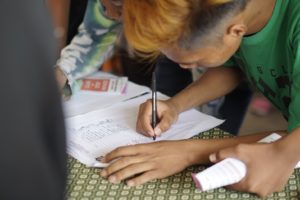 It should be emphasized that the principle of VCT is voluntary and people are not forced and obliged to do the test although it is highly recommended to carry out this test, especially for those with risk factors. VCT is recommended for pregnant women, company workers, workers in civil servants, and for people who feel that they engage in risky behavior patterns. Being willing or not to do this test is part of a person’s right to decide what he or she thinks is good for themselves and their health. The World Health Organization (WHO) has also expressed its objection to the mandatory policy of VCT in many places.
It should be emphasized that the principle of VCT is voluntary and people are not forced and obliged to do the test although it is highly recommended to carry out this test, especially for those with risk factors. VCT is recommended for pregnant women, company workers, workers in civil servants, and for people who feel that they engage in risky behavior patterns. Being willing or not to do this test is part of a person’s right to decide what he or she thinks is good for themselves and their health. The World Health Organization (WHO) has also expressed its objection to the mandatory policy of VCT in many places.
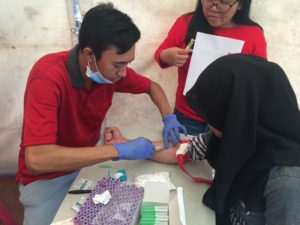
VCT is a highly recommended test especially for those who are at risks. No need to fear, because by doing this test, we can take action that we need to take. Hopefully, VCT can be done by every individual, voluntarily, everywhere in the world.
REFERENCE:
1. The Ministry of Health Republic of Indonesia
2. UNAIDS.org
